[Under Construction]
| |
The following has endeavored to reproduce all passages in the New Testament of the Bible which draw out in a special way the three members of that inner circle within the Twelve Apostles — Peter (כיפא / Κηφᾶς / Simon bar Jonah / Simon son of Jonah) and the two sons of Zebedee and, by Tradition, Salome: James (Yaʕqov / Ιάκωβος / James the Greater) and his brother John (Yoħanna / Ἰωάννης) — who, alone among His Apostles, were present with the Lord at certain key events in His earthly ministry. See for example the Transfiguration (Matthew 17:1-2) the Raising the daughter of Jairus (Mark 5:35-37) and the Passion in the Garden of Gethsemane (Matthew 26:36-37). Scripture passages where the Apostle Peter alone (that is, apart from James and/or John) is mentioned or speaks are rather reproduced on the sister page of this website, Apostolicity - the One. Bible passages wherein the Three are not set apart are reproduced on the page Apostolicity - the Twelve. Quotes are taken from the Revised Standard Version English-language translation of the Bible. |
|
|
|
|
| |
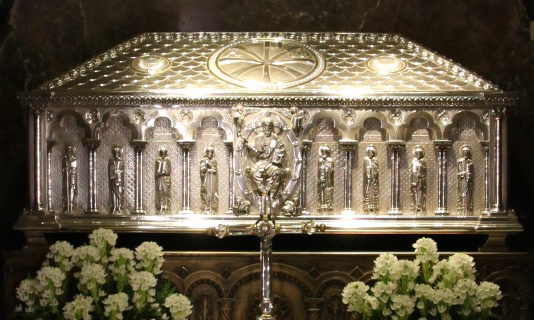 |
|
יַעֲקֹב - Ἰάκωβος - Santiago de Zebedeo/Santiago el Mayor - Иаков Зеведеев - Apostle Saint James the Greater, son of Zebedee, brother of Apostle Evangelist Saint John the Theologian. Reliquary in Santiago de Compostella, Spain.
The brothers — Βοανηργες - Boanerges, Sons of Thunder — were two of The Three Apostles Jesus selected and set apart even with the body of The Twelve Apostles, the other of The Three being Apostle Saint Peter, their leader. |
|
|
|
| |
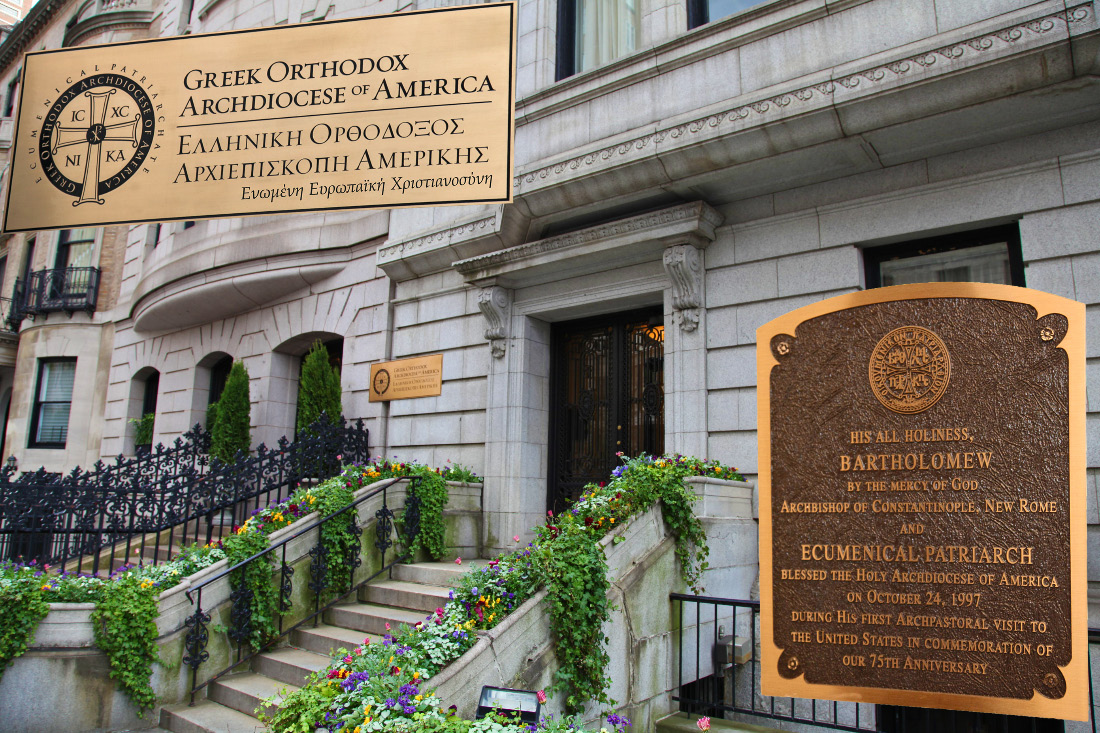 |
|
| |
Greek Orthodox Archdiocese of America, under Ecumenical Patriarch of Constantinople, His All Holiness Bartholomew, with a flock of faithful one thousand times bigger than his flock in Constantinople or throughout all of Turkey. The senior heirarch in America is presently His Eminence Archbishop Demetrios, headquarted in New York City of all places, here at 8 East 79th Street. These "ethnic" local Orthodox Churches, not only Greek, but Russian and Ukrainian and Serbian, et cetera, are ubiquitous throughout North and South America, yes, but really throughout the entire world, save Eastern Europe and parts of the Middle East. There are some legitimate, and even holy, aspects to having people be able to enjoy community with their own. Yet these aspects must be understood against other considerations, including preeminently that such an arrangement is an enormous departure from the holy canonical standard of One Bishop in One Territory. It also lends itself to Ethnophyletism — the Bane of Orthodoxy — and to a de facto heresy that might be called Orthodoxy Plus and the misuse, possibly demonaic, by temporal rulers of Orthodox Christianity to advance their most often selfish and self-centered, and often enough murderous, ends. |
|
From the Gospel According to Saint Matthew
|
|
|
|
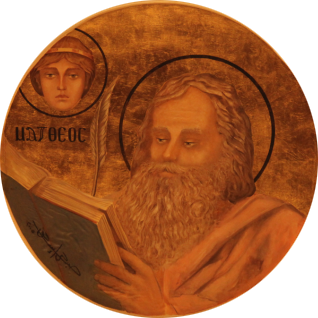
|
| And after six days Jesus took with him Peter and James and John his brother, and led them up a high mountain apart. And he was transfigured before them, and his face shone like the sun, and his garments became white as light. And behold, there appeared to them Moses and Eli'jah, talking with him. And Peter said to Jesus, "Lord, it is well that we are here; if you wish, I will make three booths here, one for you and one for Moses and one for Eli'jah." He was still speaking, when lo, a bright cloud overshadowed them, and a voice from the cloud said, "This is my beloved Son, with whom I am well pleased; listen to him." When the disciples heard this, they fell on their faces, and were filled with awe. But Jesus came and touched them, saying, "Rise, and have no fear." And when they lifted up their eyes, they saw no one but Jesus only. And as they were coming down the mountain, Jesus commanded them, "Tell no one the vision, until the Son of man is raised from the dead." |
| |
Matthew 17:1-9
(The Miracle of the Transfiguration is presented also at Mark 9:2-13 and Luke 9:28-37) |
And as Jesus was going up to Jerusalem, he took the twelve disciples aside, and on the way he said to them, "Behold, we are going up to Jerusalem; and the Son of man will be delivered to the chief priests and scribes, and they will condemn him to death, and deliver him to the Gentiles to be mocked and scourged and crucified, and he will be raised on the third day." Then the mother of the sons of Zeb'edee came up to him, with her sons, and kneeling before him she asked him for something. And he said to her, "What do you want?" She said to him, "Command that these two sons of mine may sit, one at your right hand and one at your left, in your kingdom." But Jesus answered, "You do not know what you are asking. Are you able to drink the cup that I am to drink?" They said to him, "We are able." He said to them, "You will drink my cup, but to sit at my right hand and at my left is not mine to grant, but it is for those for whom it has been prepared by my Father." And when the ten heard it, they were indignant at the two brothers. But Jesus called them to him and said, "You know that the rulers of the Gentiles lord it over them, and their great men exercise authority over them. It shall not be so among you; but whoever would be great among you must be your servant, and whoever would be first among you must be your slave; even as the Son of man came not to be served but to serve, and to give his life as a ransom for many." |
| |
Matthew 20:17-28 (included on this page because James and John Zebedee are referred to; passage also the One and the Twelve)
|
| Then Jesus went with them to a place called Gethsem'ane, and he said to his disciples, "Sit here, while I go yonder and pray." And taking with him Peter and the two sons of Zeb'edee, he began to be sorrowful and troubled. Then he said to them, "My soul is very sorrowful, even to death; remain here, and watch with me." And going a little farther he fell on his face and prayed, "My Father, if it be possible, let this cup pass from me; nevertheless, not as I will, but as thou wilt." And he came to the disciples and found them sleeping; and he said to Peter, "So, could you not watch with me one hour? Watch and pray that you may not enter into temptation; the spirit indeed is willing, but the flesh is weak." Again, for the second time, he went away and prayed, "My Father, if this cannot pass unless I drink it, thy will be done." And again he came and found them sleeping, for their eyes were heavy. So, leaving them again, he went away and prayed for the third time, saying the same words. Then he came to the disciples and said to them, "Are you still sleeping and taking your rest? Behold, the hour is at hand, and the Son of man is betrayed into the hands of sinners. Rise, let us be going; see, my betrayer is at hand." |
| |
Matthew 26:36-46; Mark 14: 32-42 (This passage recounting the Agony in the Garden of Gethsem'ane is also reproduced on this website at the One and the Twelve; unlike in Matthew and in Mark, in Luke's account, at 22:39-46, the Three are not separated from the Twelve.)
|
| |
From the Gospel According to Saint Mark
|
|
|
|
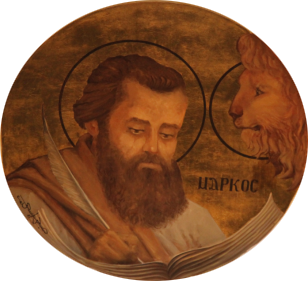
|
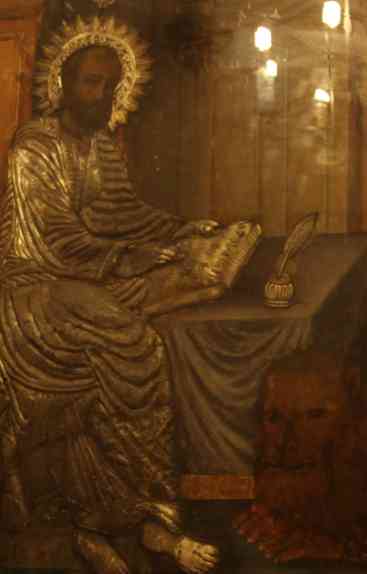
Icon from Coptic Orthodox Cathedral of Saint Mark Alexandria, Egypt |
|
|
|
| Now after John was arrested, Jesus came into Galilee, preaching the gospel of God, and saying, "The time is fulfilled, and the kingdom of God is at hand; repent, and believe in the gospel." And passing along by the Sea of Galilee, he saw Simon and Andrew the brother of Simon casting a net in the sea; for they were fishermen. And Jesus said to them, "Follow me and I will make you become fishers of men." And immediately they left their nets and followed him. And going on a little farther, he saw James the son of Zeb'edee and John his brother, who were in their boat mending the nets. And immediately he called them; and they left their father Zeb'edee in the boat with the hired servants, and followed him. And they went into Caper'na-um; and immediately on the sabbath he entered the synagogue and taught. |
| |
Mark 1:14-21 (passage also at the Twelve and at the One with commentary)
|
| And immediately he left the synagogue, and entered the house of Simon and Andrew, with James and John. Now Simon's mother-in-law lay sick with a fever, and immediately they told him of her. And he came and took her by the hand and lifted her up, and the fever left her; and she served them. |
| |
Mark 1:29-31 (passage also at the One)
|
| And he went up on the mountain, and called to him those whom he desired; and they came to him. And he appointed twelve, to be with him, and to be sent out to preach and have authority to cast out demons: Simon whom he surnamed Peter; James the son of Zeb'edee and John the brother of James, whom he surnamed Bo-aner'ges, that is, sons of thunder; Andrew, and Philip, and Bartholomew, and Matthew, and Thomas, and James the son of Alphaeus, and Thaddaeus, and Simon the Cananaean, and Judas Iscariot, who betrayed him. |
| |
Mark 3:13-19 (passage also at the One and the Twelve)
|
| Then came one of the rulers of the synagogue, Ja'irus by name; and seeing him, he fell at his feet, and besought him, saying, "My little daughter is at the point of death. Come and lay your hands on her, so that she may be made well, and live." And he went with him. And a great crowd followed him and thronged about him. And there was a woman who had had a flow of blood for twelve years, and who had suffered much under many physicians, and had spent all that she had, and was no better but rather grew worse. She had heard the reports about Jesus, and came up behind him in the crowd and touched his garment. For she said, "If I touch even his garments, I shall be made well." And immediately the hemorrhage ceased; and she felt in her body that she was healed of her disease. And Jesus, perceiving in himself that power had gone forth from him, immediately turned about in the crowd, and said, "Who touched my garments?" And his disciples said to him, "You see the crowd pressing around you, and yet you say, `Who touched me?'" And he looked around to see who had done it. But the woman, knowing what had been done to her, came in fear and trembling and fell down before him, and told him the whole truth. And he said to her, "Daughter, your faith has made you well; go in peace, and be healed of your disease." While he was still speaking, there came from the ruler's house some who said, "Your daughter is dead. Why trouble the Teacher any further?" But ignoring what they said, Jesus said to the ruler of the synagogue, "Do not fear, only believe." And he allowed no one to follow him except Peter and James and John the brother of James. When they came to the house of the ruler of the synagogue, he saw a tumult, and people weeping and wailing loudly. And when he had entered, he said to them, "Why do you make a tumult and weep? The child is not dead but sleeping." And they laughed at him. But he put them all outside, and took the child's father and mother and those who were with him, and went in where the child was. Taking her by the hand he said to her, "Tal'itha cu'mi"; which means, "Little girl, I say to you, arise." And immediately the girl got up and walked (she was twelve years of age), and they were immediately overcome with amazement. And he strictly charged them that no one should know this, and told them to give her something to eat. |
| |
Mark 5:22-43; Luke 8:41-56
(There are of course stories of two miracles within these verses, the Raising from the Dead of the Daughter of Ja'irus and the Healing of the Woman with the Hemorrhage. Regarding the Lord's healing of the woman with the hemorrhage, it is curious that in the account of Mark -- a disciple of Peter -- we see disciples of the Lord answering His question, "Who touched my garments?", while in the account of Luke -- a disciple of Paul -- Peter is singled out as having answered the Lord.)
|
| |
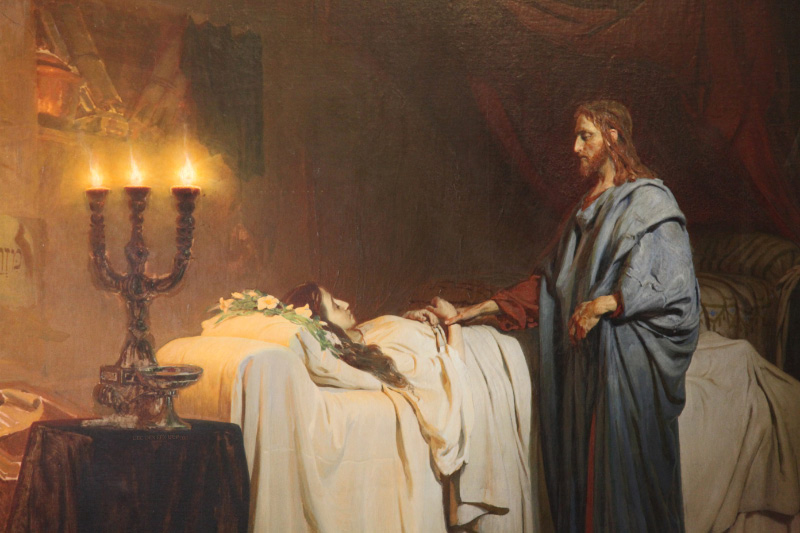
Воскрешение дочери Иаира (1871), И.Е. Репин - Jesus raising the daughter of Jairus by Ilya Repin, Russian Museum, Saint Petersburg
|
| And after six days Jesus took with him Peter and James and John, and led them up a high mountain apart by themselves; and he was transfigured before them, and his garments became glistening, intensely white, as no fuller on earth could bleach them. And there appeared to them Eli'jah with Moses; and they were talking to Jesus. And Peter said to Jesus, "Master, it is well that we are here; let us make three booths, one for you and one for Moses and one for Eli'jah." For he did not know what to say, for they were exceedingly afraid. And a cloud overshadowed them, and a voice came out of the cloud, "This is my beloved Son; listen to him." And suddenly looking around they no longer saw any one with them but Jesus only. And as they were coming down the mountain, he charged them to tell no one what they had seen, until the Son of man should have risen from the dead. So they kept the matter to themselves, questioning what the rising from the dead meant. And they asked him, "Why do the scribes say that first Eli'jah must come?" And he said to them, "Eli'jah does come first to restore all things; and how is it written of the Son of man, that he should suffer many things and be treated with contempt? But I tell you that Eli'jah has come, and they did to him whatever they pleased, as it is written of him." |
| |
Mark 9:2-13 (passage also at the One)
(The Miracle of the Transfiguration is presented also at Matthew 17:1-9 and Luke 9:28-37)
|
| And they came to Caper'na-um; and when he was in the house he asked them, "What were you discussing on the way?" But they were silent; for on the way they had discussed with one another who was the greatest. And he sat down and called the twelve; and he said to them, "If any one would be first, he must be last of all and servant of all." And he took a child, and put him in the midst of them; and taking him in his arms, he said to them, "Whoever receives one such child in my name receives me; and whoever receives me, receives not me but him who sent me." John said to him, "Teacher, we saw a man casting out demons in your name, and we forbade him, because he was not following us." But Jesus said, "Do not forbid him; for no one who does a mighty work in my name will be able soon after to speak evil of me. For he that is not against us is for us. For truly, I say to you, whoever gives you a cup of water to drink because you bear the name of Christ, will by no means lose his reward. " |
| |
Mark 9:33-41; a similar passage is at Luke 9: 38-55 (passage also at the One and the Twelve)
|
| And they were on the road, going up to Jerusalem, and Jesus was walking ahead of them; and they were amazed, and those who followed were afraid. And taking the twelve again, he began to tell them what was to happen to him, saying, "Behold, we are going up to Jerusalem; and the Son of man will be delivered to the chief priests and the scribes, and they will condemn him to death, and deliver him to the Gentiles; and they will mock him, and spit upon him, and scourge him, and kill him; and after three days he will rise." And James and John, the sons of Zeb'edee, came forward to him, and said to him, "Teacher, we want you to do for us whatever we ask of you." And he said to them, "What do you want me to do for you?" And they said to him, "Grant us to sit, one at your right hand and one at your left, in your glory." But Jesus said to them, "You do not know what you are asking. Are you able to drink the cup that I drink, or to be baptized with the baptism with which I am baptized?" And they said to him, "We are able." And Jesus said to them, "The cup that I drink you will drink; and with the baptism with which I am baptized, you will be baptized; but to sit at my right hand or at my left is not mine to grant, but it is for those for whom it has been prepared." And when the ten heard it, they began to be indignant at James and John. And Jesus called them to him and said to them, "You know that those who are supposed to rule over the Gentiles lord it over them, and their great men exercise authority over them. But it shall not be so among you; but whoever would be great among you must be your servant, and whoever would be first among you must be slave of all. For the Son of man also came not to be served but to serve, and to give his life as a ransom for many." |
| |
Mark 10:32-45 (passage also at the One and the Twelve)
|
| And as he sat on the Mount of Olives opposite the temple, Peter and James and John and Andrew asked him privately, "Tell us, when will this be, and what will be the sign when these things are all to be accomplished?" And Jesus began to say to them, "Take heed that no one leads you astray. Many will come in my name, saying, `I am he!' and they will lead many astray. And when you hear of wars and rumors of wars, do not be alarmed; this must take place, but the end is not yet. For nation will rise against nation, and kingdom against kingdom; there will be earthquakes in various places, there will be famines; this is but the beginning of the birth-pangs. "But take heed to yourselves; for they will deliver you up to councils; and you will be beaten in synagogues; and you will stand before governors and kings for my sake, to bear testimony before them. And the gospel must first be preached to all nations. And when they bring you to trial and deliver you up, do not be anxious beforehand what you are to say; but say whatever is given you in that hour, for it is not you who speak, but the Holy Spirit. And brother will deliver up brother to death, and the father his child, and children will rise against parents and have them put to death; and you will be hated by all for my name's sake. But he who endures to the end will be saved. "But when you see the desolating sacrilege set up where it ought not to be (let the reader understand), then let those who are in Judea flee to the mountains; let him who is on the housetop not go down, nor enter his house, to take anything away; and let him who is in the field not turn back to take his mantle. And alas for those who are with child and for those who give suck in those days! Pray that it may not happen in winter. For in those days there will be such tribulation as has not been from the beginning of the creation which God created until now, and never will be. And if the Lord had not shortened the days, no human being would be saved; but for the sake of the elect, whom he chose, he shortened the days. And then if any one says to you, `Look, here is the Christ!' or `Look, there he is!' do not believe it. False Christs and false prophets will arise and show signs and wonders, to lead astray, if possible, the elect. But take heed; I have told you all things beforehand. "But in those days, after that tribulation, the sun will be darkened, and the moon will not give its light, and the stars will be falling from heaven, and the powers in the heavens will be shaken. And then they will see the Son of man coming in clouds with great power and glory. And then he will send out the angels, and gather his elect from the four winds, from the ends of the earth to the ends of heaven. "From the fig tree learn its lesson: as soon as its branch becomes tender and puts forth its leaves, you know that summer is near. So also, when you see these things taking place, you know that he is near, at the very gates. Truly, I say to you, this generation will not pass away before all these things take place. Heaven and earth will pass away, but my words will not pass away. "But of that day or that hour no one knows, not even the angels in heaven, nor the Son, but only the Father. Take heed, watch; for you do not know when the time will come. It is like a man going on a journey, when he leaves home and puts his servants in charge, each with his work, and commands the doorkeeper to be on the watch. Watch therefore -- for you do not know when the master of the house will come, in the evening, or at midnight, or at cockcrow, or in the morning -- lest he come suddenly and find you asleep. And what I say to you I say to all: Watch." (emphasis added) |
| |
Mark 13:3-37 (A long passage, almost all of Chapter 3, but the Lord is speaking, and He cannot be interrupted.)
|
| And they went to a place which was called Gethsem'ane; and he said to his disciples, "Sit here, while I pray." And he took with him Peter and James and John, and began to be greatly distressed and troubled. And he said to them, "My soul is very sorrowful, even to death; remain here, and watch." And going a little farther, he fell on the ground and prayed that, if it were possible, the hour might pass from him. And he said, "Abba, Father, all things are possible to thee; remove this cup from me; yet not what I will, but what thou wilt." And he came and found them sleeping, and he said to Peter, "Simon, are you asleep? Could you not watch one hour? Watch and pray that you may not enter into temptation; the spirit indeed is willing, but the flesh is weak." And again he went away and prayed, saying the same words. And again he came and found them sleeping, for their eyes were very heavy; and they did not know what to answer him. And he came the third time, and said to them, "Are you still sleeping and taking your rest? It is enough; the hour has come; the Son of man is betrayed into the hands of sinners. Rise, let us be going; see, my betrayer is at hand." |
| |
Mark 14: 32-42; Matthew 26:36-46 (This passage recounting the Agony in the Garden of Gethsem'ane is also reproduced on this website at the One and the Twelve; unlike in Matthew and in Mark, in Luke's account, at 22:39-46, the Three are not separated from the Twelve.)
|
| |
|
|
|
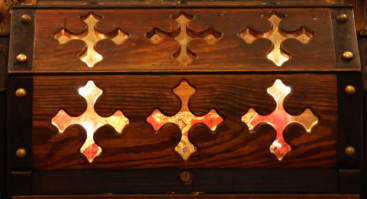
Relics of Saint Mark in the Coptic Orthodox Cathedral of Saint Mark, Alexandria, Egypt |
From the Gospel According to Saint Luke
|
|
|
|
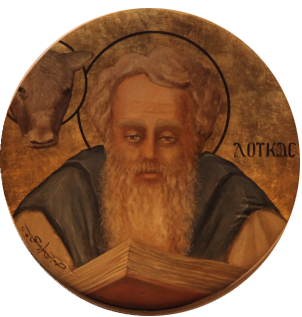
|
| While the people pressed upon him to hear the word of God, he was standing by the lake of Gennes'aret. And he saw two boats by the lake; but the fishermen had gone out of them and were washing their nets. Getting into one of the boats, which was Simon's, he asked him to put out a little from the land. And he sat down and taught the people from the boat. And when he had ceased speaking, he said to Simon, "Put out into the deep and let down your nets for a catch." And Simon answered, "Master, we toiled all night and took nothing! But at your word I will let down the nets." And when they had done this, they enclosed a great shoal of fish; and as their nets were breaking, they beckoned to their partners in the other boat to come and help them. And they came and filled both the boats, so that they began to sink. But when Simon Peter saw it, he fell down at Jesus' knees, saying, "Depart from me, for I am a sinful man, O Lord." For he was astonished, and all that were with him, at the catch of fish which they had taken; and so also were James and John, sons of Zeb'edee, who were partners with Simon. And Jesus said to Simon, "Do not be afraid; henceforth you will be catching men." And when they had brought their boats to land, they left everything and followed him. |
| |
Luke 5:1-11 |
| And there came a man named Ja'irus, who was a ruler of the synagogue; and falling at Jesus' feet he besought him to come to his house, for he had an only daughter, about twelve years of age, and she was dying. As he went, the people pressed round him. And a woman who had had a flow of blood for twelve years and could not be healed by any one, came up behind him, and touched the fringe of his garment; and immediately her flow of blood ceased. And Jesus said, "Who was it that touched me?" When all denied it, Peter said, "Master, the multitudes surround you and press upon you!" But Jesus said, "Some one touched me; for I perceive that power has gone forth from me." And when the woman saw that she was not hidden, she came trembling, and falling down before him declared in the presence of all the people why she had touched him, and how she had been immediately healed. And he said to her, "Daughter, your faith has made you well; go in peace." While he was still speaking, a man from the ruler's house came and said, "Your daughter is dead; do not trouble the Teacher any more." But Jesus on hearing this answered him, "Do not fear; only believe, and she shall be well." And when he came to the house, he permitted no one to enter with him, except Peter and John and James, and the father and mother of the child. And all were weeping and bewailing her; but he said, "Do not weep; for she is not dead but sleeping." And they laughed at him, knowing that she was dead. But taking her by the hand he called, saying, "Child, arise." And her spirit returned, and she got up at once; and he directed that something should be given her to eat. And her parents were amazed; but he charged them to tell no one what had happened. |
| |
Luke 8:41-56 (passage also at the One); Mark 5:22-43
(There are of course stories of two miracles within these verses, the Raising from the Dead of the Daughter of Ja'irus and the Healing of the Woman with the Hemorrhage.. Regarding the Lord's healing of the woman with the hemorrhage, it is curious that in the account of Mark -- a disciple of Peter -- we see disciples of the Lord answering His question, "Who touched my garments?", while in the account of Luke -- a disciple of Paul -- Peter is singled out as having answered the Lord.) |
| Now about eight days after these sayings he took with him Peter and John and James, and went up on the mountain to pray. And as he was praying, the appearance of his countenance was altered, and his raiment became dazzling white. And behold, two men talked with him, Moses and Eli'jah, who appeared in glory and spoke of his departure, which he was to accomplish at Jerusalem. Now Peter and those who were with him were heavy with sleep, and when they wakened they saw his glory and the two men who stood with him. And as the men were parting from him, Peter said to Jesus, "Master, it is well that we are here; let us make three booths, one for you and one for Moses and one for Eli'jah" -- not knowing what he said. As he said this, a cloud came and overshadowed them; and they were afraid as they entered the cloud. And a voice came out of the cloud, saying, "This is my Son, my Chosen; listen to him!" And when the voice had spoken, Jesus was found alone. And they kept silence and told no one in those days anything of what they had seen. On the next day, when they had come down from the mountain, a great crowd met him. |
| |
Luke 9:28-37 (passage also at the One)
(The Miracle of the Transfiguration is presented also at Matthew 17:1-9 and Mark 9:2-13) |
| And behold, a man from the crowd cried, "Teacher, I beg you to look upon my son, for he is my only child; and behold, a spirit seizes him, and he suddenly cries out; it convulses him till he foams, and shatters him, and will hardly leave him. And I begged your disciples to cast it out, but they could not." Jesus answered, "O faithless and perverse generation, how long am I to be with you and bear with you? Bring your son here." While he was coming, the demon tore him and convulsed him. But Jesus rebuked the unclean spirit, and healed the boy, and gave him back to his father. And all were astonished at the majesty of God. But while they were all marveling at everything he did, he said to his disciples, "Let these words sink into your ears; for the Son of man is to be delivered into the hands of men." But they did not understand this saying, and it was concealed from them, that they should not perceive it; and they were afraid to ask him about this saying. And an argument arose among them as to which of them was the greatest. But when Jesus perceived the thought of their hearts, he took a child and put him by his side, and said to them, "Whoever receives this child in my name receives me, and whoever receives me receives him who sent me; for he who is least among you all is the one who is great." John answered, "Master, we saw a man casting out demons in your name, and we forbade him, because he does not follow with us." But Jesus said to him, "Do not forbid him; for he that is not against you is for you." When the days drew near for him to be received up, he set his face to go to Jerusalem. And he sent messengers ahead of him, who went and entered a village of the Samaritans, to make ready for him; but the people would not receive him, because his face was set toward Jerusalem. And when his disciples James and John saw it, they said, "Lord, do you want us to bid fire come down from heaven and consume them?" But he turned and rebuked them. (emphasis added) |
| |
Luke 9: 38-55 (passage also at the Twelve)
(A similar passage is at Mark 9:33-41. Here, as in Matthew 20:17-28 and Mark Chapter 10, we see the other two of the Three, that is, James and John Zebedee, singled out without Peter, but not in a particularly favorable light. Still, the prominence of the inner group finds additional emphasis in these passages)
|
| Then came the day of Unleavened Bread, on which the passover lamb had to be sacrificed. So Jesus sent Peter and John, saying, "Go and prepare the passover for us, that we may eat it." They said to him, "Where will you have us prepare it?" He said to them, "Behold, when you have entered the city, a man carrying a jar of water will meet you; follow him into the house which he enters, and tell the householder, `The Teacher says to you, Where is the guest room, where I am to eat the passover with my disciples?' And he will show you a large upper room furnished; there make ready." And they went, and found it as he had told them; and they prepared the passover. |
| |
Luke 22:7-13 |
From the Gospel According to Saint John
|
|
|
|
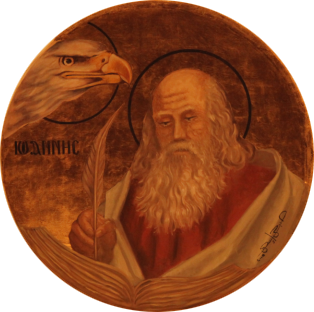
|
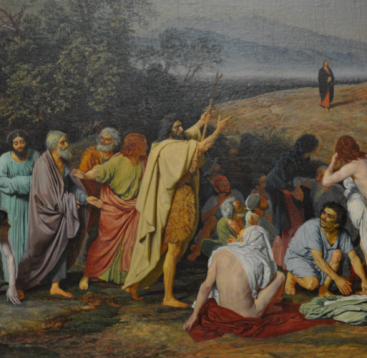
Behold, the Lamb of God!
Государственный Русский Музей
Saint Petersburg |
|
The next day again John [the Baptist] was standing with two of his disciples; and he looked at Jesus as he walked, and said, "Behold, the Lamb of God!" The two disciples heard him say this, and they followed Jesus. Jesus turned, and saw them following, and said to them, "What do you seek?" And they said to him, "Rabbi" (which means Teacher), "where are you staying?" He said to them, "Come and see." They came and saw where he was staying; and they stayed with him that day, for it was about the tenth hour. One of the two who heard John speak, and followed him, was Andrew, Simon Peter's brother. He first found his brother Simon, and said to him, "We have found the Messiah" (which means Christ). He brought him to Jesus. Jesus looked at him, and said, "So you are Simon the son of John? You shall be called Cephas" (which means Peter). The next day Jesus decided to go to Galilee. And he found Philip and said to him, "Follow me." Now Philip was from Beth-sa'ida, the city of Andrew and Peter. Philip found Nathanael, and said to him, "We have found him of whom Moses in the law and also the prophets wrote, Jesus of Nazareth, the son of Joseph." Nathan'a-el said to him, "Can anything good come out of Nazareth?" Philip said to him, "Come and see." Jesus saw Nathan'a-el coming to him, and said of him, "Behold, an Israelite indeed, in whom is no guile!" Nathan'a-el said to him, "How do you know me?" Jesus answered him, "Before Philip called you, when you were under the fig tree, I saw you." Nathanael answered him, "Rabbi, you are the Son of God! You are the King of Israel!" Jesus answered him, "Because I said to you, I saw you under the fig tree, do you believe? You shall see greater things than these." And he said to him, "Truly, truly, I say to you, you will see heaven opened, and the angels of God ascending and descending upon the Son of man." (emphasis added)
|
| |
John 1:35-51 (passage also at the Twelve and at the One with important commentary) |
| |
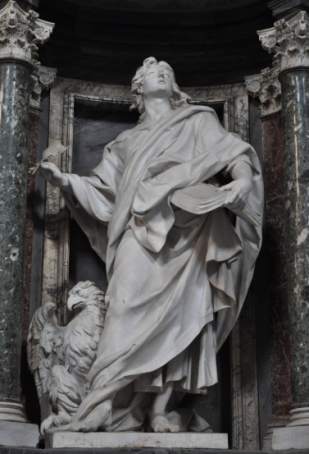
Saint John Lateran, Rome |
|
The Gospel According to Saint John must hold a special place within a discussion of God's plan for the Three within the group(s) of Jesus' disciples, because the author of the Gospel (as authorship was understood in apostolic times) — John, the son of Zeb'edee and the brother of the Apostle James the Greater — was himself one of the Three which constituted that special inner circle of Apostles who Jesus invited, alone among His Apostles, to be present at certain key events in Jesus earthly ministry:
|
| |
the Miracle of the Raising from the Dead of the Daughter of Ja'irus |
| |
|
Mark 5:22-43; Luke 8:41-56
|
| |
the Miracle of the Transfiguration |
| |
|
Matthew 17:1-9; Mark 9:2-13; Luke 9:28-37; 2 Peter 1:13-19
A central event in the Gospel narrative, showing the divinity of God the Son Incarnate Jesus Christ, and with God the Father communicating to the Three Apostles chosen by Jesus to bear witness to the event: "This is my beloved Son; listen to him."
|
| |
the Agony in the Garden of Gethsem'ane |
| |
|
Matthew 26:36-46; Mark 14: 32-42
(and Luke 22:39-46, but in Luke's account the Three are not separated from the Twelve) |
| |
|
|
| |
And one will note that in John's Gospel narrative alone of the four, these three events are not described. |
| |
| So the soldiers did this. But standing by the cross of Jesus were his mother, and his mother's sister, Mary the wife of Clopas, and Mary Mag'dalene. When Jesus saw his mother, and the disciple whom he loved standing near, he said to his mother, "Woman, behold, your son!" Then he said to the disciple, "Behold, your mother!" And from that hour the disciple took her to his own home. After this Jesus, knowing that all was now finished, said (to fulfil the scripture), "I thirst." A bowl full of vinegar stood there; so they put a sponge full of the vinegar on hyssop and held it to his mouth. When Jesus had received the vinegar, he said, "It is finished"; and he bowed his head and gave up his spirit. |
| |
John 19:25-30 Christ's gift of His Mother to all humankind through John |
| But one of the soldiers pierced his side with a spear, and at once there came out blood and water. He who saw it has borne witness -- his testimony is true, and he knows that he tells the truth -- that you also may believe. For these things took place that the scripture might be fulfilled, "Not a bone of him shall be broken." And again another scripture says, "They shall look on him whom they have pierced." (emphasis added) |
| |
John 19:34-37
(In his Gospel, Saint John here again emphasizes that he was an eyewitness to Jesus crucifixion.) |
| Now on the first day of the week Mary Magdalene came to the tomb early, while it was still dark, and saw that the stone had been taken away from the tomb. So she ran, and went to Simon Peter and the other disciple, the one whom Jesus loved, and said to them, "They have taken the Lord out of the tomb, and we do not know where they have laid him." Peter then came out with the other disciple, and they went toward the tomb. They both ran, but the other disciple outran Peter and reached the tomb first; and stooping to look in, he saw the linen cloths lying there, but he did not go in. Then Simon Peter came, following him, and went into the tomb; he saw the linen cloths lying, and the napkin, which had been on his head, not lying with the linen cloths but rolled up in a place by itself. Then the other disciple, who reached the tomb first, also went in, and he saw and believed; for as yet they did not know the scripture, that he must rise from the dead. Then the disciples went back to their homes. But Mary stood weeping outside the tomb, and as she wept she stooped to look into the tomb; and she saw two angels in white, sitting where the body of Jesus had lain, one at the head and one at the feet. They said to her, "Woman, why are you weeping?" She said to them, "Because they have taken away my Lord, and I do not know where they have laid him." Saying this, she turned round and saw Jesus standing, but she did not know that it was Jesus. Jesus said to her, "Woman, why are you weeping? Whom do you seek?" Supposing him to be the gardener, she said to him, "Sir, if you have carried him away, tell me where you have laid him, and I will take him away." Jesus said to her, "Mary." She turned and said to him in Hebrew, "Rab-bo'ni!" (which means Teacher). Jesus said to her, "Do not hold me, for I have not yet ascended to the Father; but go to my brethren and say to them, I am ascending to my Father and your Father, to my God and your God." Mary Mag'dalene went and said to the disciples, "I have seen the Lord"; and she told them that he had said these things to her. |
| |
John 20:1-18 (passage also reproduced at the One, the Twelve, the Seventy and Christian Women Leaders)
|
After this Jesus revealed himself again to the disciples by the Sea of Tibe'ri-as; and he revealed himself in this way. Simon Peter, Thomas called the Twin, Nathan'a-el of Cana in Galilee, the sons of Zeb'edee, and two others of his disciples were together. Simon Peter said to them, "I am going fishing." They said to him, "We will go with you." They went out and got into the boat; but that night they caught nothing. Just as day was breaking, Jesus stood on the beach; yet the disciples did not know that it was Jesus. Jesus said to them, "Children, have you any fish?" They answered him, "No." He said to them, "Cast the net on the right side of the boat, and you will find some." So they cast it, and now they were not able to haul it in, for the quantity of fish. That disciple whom Jesus loved said to Peter, "It is the Lord!" When Simon Peter heard that it was the Lord, he put on his clothes, for he was stripped for work, and sprang into the sea. But the other disciples came in the boat, dragging the net full of fish, for they were not far from the land, but about a hundred yards off. When they got out on land, they saw a charcoal fire there, with fish lying on it, and bread. Jesus said to them, "Bring some of the fish that you have just caught." So Simon Peter went aboard and hauled the net ashore, full of large fish, a hundred and fifty-three of them; and although there were so many, the net was not torn. Jesus said to them, "Come and have breakfast." Now none of the disciples dared ask him, "Who are you?" They knew it was the Lord. Jesus came and took the bread and gave it to them, and so with the fish. This was now the third time that Jesus was revealed to the disciples after he was raised from the dead. When they had finished breakfast, Jesus said to Simon Peter, "Simon, son of John, do you love me more than these?" He said to him, "Yes, Lord; you know that I love you." He said to him, "Feed my lambs." A second time he said to him, "Simon, son of John, do you love me?" He said to him, "Yes, Lord; you know that I love you." He said to him, "Tend my sheep." He said to him the third time, "Simon, son of John, do you love me?" Peter was grieved because he said to him the third time, "Do you love me?" And he said to him, "Lord, you know everything; you know that I love you." Jesus said to him, "Feed my sheep. Truly, truly, I say to you, when you were young, you girded yourself and walked where you would; but when you are old, you will stretch out your hands, and another will gird you and carry you where you do not wish to go." (This he said to show by what death he was to glorify God.) And after this he said to him, "Follow me." Peter turned and saw following them the disciple whom Jesus loved, who had lain close to his breast at the supper and had said, "Lord, who is it that is going to betray you?" When Peter saw him, he said to Jesus, "Lord, what about this man?" Jesus said to him, "If it is my will that he remain until I come, what is that to you? Follow me!" The saying spread abroad among the brethren that this disciple was not to die; yet Jesus did not say to him that he was not to die, but, "If it is my will that he remain until I come, what is that to you?" This is the disciple who is bearing witness to these things, and who has written these things; and we know that his testimony is true. But there are also many other things which Jesus did; were every one of them to be written, I suppose that the world itself could not contain the books that would be written. |
| |
John Chapter Twenty-One (also reproduced at the One and the Twelve) |
| |
|
| |
|
| |
|
| |
|
| |
|
| |
|
| Rise, and have no fear. |
|
This is my beloved Son, with whom I am well pleased; listen to him. |
the Holy Spirit |
Man proposes, God disposes |
|